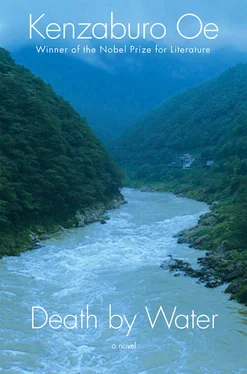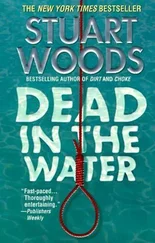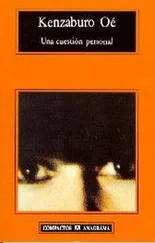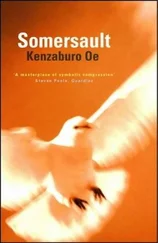Asa then lapsed into silence and concentrated on piloting the car while I dozed fitfully in the passenger seat. Just as she’d said, it was about an hour later when we stopped the car at a place where the riverbank had been made into a park. Asa mentioned that my mother had planted pomegranates and camellias around the monument but they were gone, having been “tidied up” as part of the construction process. Jutting out of the bare ground was a large round stone that appeared to be a fragment of a meteorite. When I gazed up at the stone — it was a pale, vegetal shade of green, like early-spring onions — I saw that it was inscribed with five spare, calligraphic lines of Japanese characters. Some years earlier I had written those lines with a fountain pen, and the words had been enlarged and then expertly engraved on the stone.
You didn’t get Kogii ready to go up into the forest
And like the river current, you won’t return home.
In Tokyo during the dry season
I’m remembering everything backward,
From old age to earliest childhood.
“It reads better than I’d expected, considering all the fuss it provoked,” I said.
“For some reason the beginning — that is, Mother’s two-line poem — just didn’t sit well with people from the start,” Asa said. “They were complaining it wasn’t a proper haiku, yet it wasn’t a tanka, either. That couldn’t be helped, but the professor who was the adviser for the commemorative-stone committee summoned me to Matsuyama and made no secret of his displeasure. ‘What is this supposed to be, anyhow?’ he asked. ‘A parody of a Misora Hibari song?’
“Needless to say, that got my hackles up. So I told him, in no uncertain terms: ‘The line in the Hibari song is like the flowing of water, while this is like the river current. My mother doesn’t plagiarize!’ Then I went on to explain that the people around these parts speak of being ‘taken by the current’ when someone either drowns in the river or else is saved after being carried downstream in a flood. The people borne away by the current — obviously, the drowned, but even those who are rescued from the rushing waters — always seem to end up leaving the village, so the phrase has become a metaphor for going away and not returning, except maybe to visit once in a blue moon. And there’s the implied dig about certain people who go off to Tokyo to study and then stay there, almost as if the river had carried them away, even though they solemnly promised to return to the village someday … well, you know better than anyone that there’s nothing obscure about that. I explained those nuances to the adviser, and when I mentioned that I realized the first line of the poem might be difficult for an outsider to understand, he got all arrogant and defensive (I mean, he’s a university professor, right?) and informed me that he is the author of several scholarly books about the folklore and history of this area. He never did accept my interpretation, but in the end I made sure the stone was carved with the words you sent, exactly as you wrote them.”
Asa took a breath, then continued: “I really have my doubts about whether the professor even understood the first line. I mean, he couldn’t be expected to know that in our house your childhood nickname was Kogii, or that you were sharing your life in those days with a supernatural alter ego who was also called Kogii. Only someone who was intimately familiar with your work would be aware of such details. On the other hand, as you’re well aware, when we talk about sending someone up into the forest it’s usually a metaphor for dying, but it can also refer to holding a memorial service for someone who has passed away. Surely the professor would have discovered that through his research, at least.”
“You don’t know exactly where Father’s body washed up when it was carried downstream from here, do you?” I asked. “You did say that the first memory of your childhood was of the hours just after his body was brought back to our house, but …”
“I remember clearly that you told me to check around the futon where our dead father was laid out, to see if a dead child was lying nearby. Twenty-some years later, when I heard you were having a strange recurrent dream, it sounded like a joke at first, but then I realized it could also be the unbearably sad remembrance of something that really did happen. And I couldn’t help wondering whether, just maybe, the dream might be rooted in the fact that you ran away from the boat that took our father to his watery grave. But anyhow,” Asa continued, “I was walking around and around the dead person, lying on the tatami with a cloth over his face. At one point I stumbled and fell, and when I reached out to brace myself I touched his thick, wet hair with my outstretched hand. I remember that creepy sensation vividly, so I believe you when you say Father drowned after being carried away by the current, even though Mother would never talk about it.”
“Do you remember when I commuted for a year to the new postwar high school near here, before our village was incorporated?” I said. “One day during art period, we went to that shoal to do some plein air sketching. The teacher had set up his easel facing a spot on the edge of the sandbank where there was a thick stand of pussy willows, and he was working on an oil painting. As I was wandering aimlessly about, he called me over and said, ‘I’ve heard this spot has been known for years as the place where Mr. Choko washed ashore. Does that have something to do with your family, by any chance?’
“Of course, we were all in deep denial about the circumstances behind Father’s drowning, but in the outside world, everyone seemed to know about it. I think that probably goes a long way toward explaining how Mother happened to write the words ‘river current’ in the little poem on the stone.”
Walking along under a canopied row of cherry trees so heavily overgrown that hardly any light fell on the road (I’d heard they were already slated for clear-cutting), we returned to the car. As we drove the twenty-plus minutes to our hometown — the picturesque mountain valley deep in a forest, where we both grew up — Asa spoke about some things she had evidently been mulling over for quite a while.
“Listen, Kogii,” she said, “I was very happy when you said you’d be coming to stay for a while in the Forest House. It will be good for you to get some closure with the red leather trunk, after all these years, but at the same time I couldn’t help thinking, Yep, my big brother is definitely getting old. One thing I’ve noticed about aging is that it gives rise to a desire to get things settled. And at this stage, it’s only natural to start having thoughts about death.
“Needless to say, I’m aging right along with you, and that’s why I think about these things. But really, isn’t the relevant question what happens between now and then? I mean, even if you’ve resigned yourself to the inevitability of death, you still have to deal with the intervening time until the day arrives. Death is going to find us all, no matter what, but we still have to take active responsibility for what remains of our lives.
“Take the poem our mother wrote — let’s just call it a haiku, shall we? I really think those lines were meant as a message from her to you, to be read when you eventually came home and saw the commemorative stone: You didn’t get Kogii ready to go up into the forest / And like the river current, you won’t return home.
“As a kind of counterpoint, in the three lines you contributed you made it clear you won’t be coming back here. You’re up there in Tokyo, pondering various things — you were echoing the quote from Eliot about ‘an old man in a dry month,’ right? And that’s fine, but compared with the two lines Mother wrote your response strikes me as much more blasé, which is exactly what I would have expected from you.
Читать дальше










